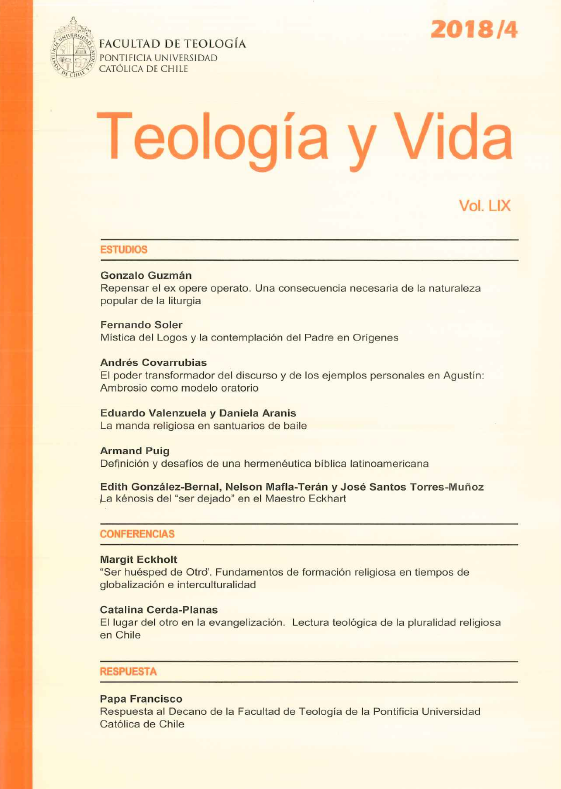Definición y desafíos de una hermenéutica bíblica latinoamericana
Contenido principal del artículo
Resumen
Resumen: El presente artículo busca recoger y estructurar teológicamente las exposiciones y discusiones realizadas durante del cuarto encuentro del grupo regional de Latinoamérica y el Caribe de la Studiorum Novi Testamenti Societas (SNTS), que estuvo centrado en la siguiente pregunta ¿Existe una hermenéutica bíblica propia de Latinoamérica? El presente trabajo se hace eco de manera personal de los desafíos planteados en el encuentro, que giraron en torno a las relaciones entre exégesis científica y hermenéutica contextual. Primero se desarrolla la necesidad de la exégesis científica como condición para la interpretación del texto bíblico. Luego se pasa a describir algunos elementos centrales de la hermenéutica latinoamericana, basados en tres palabras clave: pueblo, pobres y cultura. Los diversos momentos de la lectura de la Escritura no deben ser comprendidos como sucesivos, sino articulados en una circularidad incesante.
Palabras clave: exégesis bíblica, hermenéutica latinoamericana, Nuevo Testamento
Abstract: This paper seeks to summarize and offer a theological structure to the contributions submitted to the forth meeting of the Latin American and Caribean section of Studiorum Novi Testamenti Societas (SNTS). The seminar studied the following question: Is there a Latin American biblical hermeneutics? The main discussion was about the relationship between scientific exegesis and contextual hermeneutics. The first part of the paper explains the need of scientific exegesis as previous condition for the interpretation of the biblical text. The second, describes some central components of the Latin American hermeneutics: people, poor and culture. Exegesis and hermeneutics are not successive but permanently circular intellectual exercises.
Keywords: biblical exegesis, Latin American hermeneutics, New Testament.
Detalles del artículo
Los autores de artículos aceptados en Teología y Vida conservan los derechos de propiedad intelectual sobre sus trabajos y otorgan a la revista los permisos de distribución y comunicación pública de los mismos, consintiendo que se publiquen bajo una licencia Creative Commons (BY-NC-ND) 4.0 Internacional, que se otorga por todo el plazo de protección de la obra y con un carácter no exclusivo. La única limitación para el autor es que sólo podrá otorgar licencias no exclusivas sobre su obra. Esta licencia no permite la generación de obras derivadas ni hacer un uso comercial de la obra original, es decir, sólo son posibles los usos y finalidad que no tengan carácter comercial.
Se recomienda a los autores publicar su trabajo en Internet (por ejemplo en páginas institucionales o personales, repositorios, etc.) respetando las condiciones de esta licencia y citando debidamente la fuente original.

